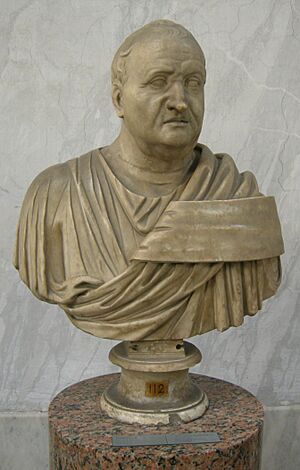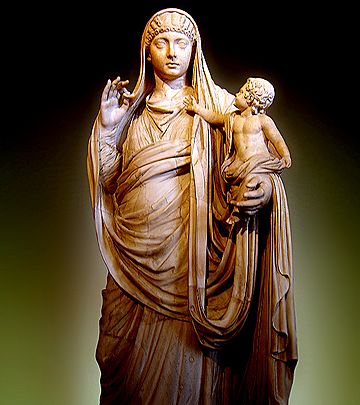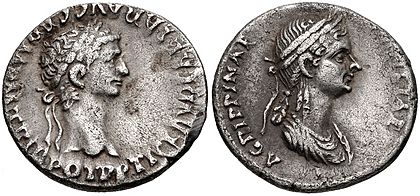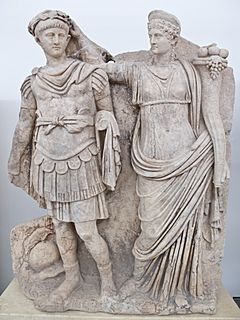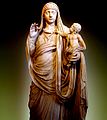Agrippina the Younger facts for kids
Quick facts for kids Agrippina the Younger |
|
|---|---|
| Augusta | |
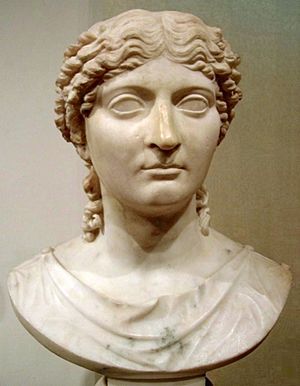
A bust at the National Museum, Warsaw
|
|
| Roman empress | |
| Tenure | 1 January AD 49 – 13 October AD 54 |
| Born | 6 November AD 15 Oppidum Ubiorum |
| Died | 23 March AD 59 (aged 43) Misenum, Italy |
| Spouse | Gnaeus Domitius Ahenobarbus Gaius Sallustius Passienus Crispus Claudius |
| Issue | Nero |
| Dynasty | Julio-Claudian |
| Father | Germanicus |
| Mother | Agrippina the Elder |
| Roman imperial dynasties | |||
| Julio-Claudian dynasty | |||
| Chronology | |||
| Augustus | 27 BC – AD 14 | ||
| Tiberius | AD 14–37 | ||
| Caligula | AD 37–41 | ||
| Claudius | AD 41–54 | ||
| Nero | AD 54–68 | ||
| Succession | |||
| Preceded by Roman Republic |
Followed by Year of the Four Emperors |
||
| Category | |||
Julia Agrippina (born November 6, AD 15 – died March 23, AD 59), also known as Agrippina the Younger, was an important Roman empress. She was the fourth wife and niece of Emperor Claudius.
Agrippina was one of the most powerful women in the Julio-Claudian dynasty, a famous Roman ruling family. She was the daughter of the Roman general Germanicus and Agrippina the Elder. Her great-grandfather was Augustus, the first Roman emperor. Agrippina's father, Germanicus, was the nephew and chosen heir of the second emperor, Tiberius.
Her brother Caligula became emperor in AD 37. After Caligula was killed in AD 41, Agrippina's uncle, Claudius, became emperor. Agrippina married Claudius in AD 49.
Agrippina was a clever advisor behind the scenes in Roman politics. She worked to make sure her son Nero would become the next emperor. Claudius became aware of her plans, but he died in AD 54. It was rumored that Agrippina was involved in his death. Agrippina had a lot of power during the first years of Emperor Nero's rule. However, she was killed in AD 59. Historical writings describe Agrippina as a strong-willed and determined woman. She was also known for her beauty.
Contents
Agrippina's Family Connections
Agrippina was the first daughter and fourth child of Agrippina the Elder and Germanicus. She had three older brothers: Nero Caesar, Drusus Caesar, and the future emperor Caligula. She also had two younger sisters: Julia Drusilla and Julia Livilla. Sadly, Agrippina's two oldest brothers and her mother faced difficulties due to political plots.
Agrippina was named after her mother, Agrippina the Elder. Her mother was known as a respectable and brave woman. Agrippina the Elder was the daughter of Julia the Elder and the important statesman Marcus Vipsanius Agrippa. Julia the Elder's father was Emperor Augustus, making Agrippina the Younger a great-granddaughter of Augustus.
Agrippina's father, Germanicus, was a very popular general and politician. His mother was Antonia Minor, and his father was the general Nero Claudius Drusus. Germanicus had two younger siblings: a sister named Livilla and a brother, who would become Emperor Claudius. Claudius was Agrippina's uncle and later her third husband.
Antonia Minor was the daughter of Octavia the Younger and Mark Antony. Octavia was Augustus's sister. Germanicus's father, Drusus the Elder, was the son of Empress Livia Drusilla. He was Emperor Tiberius's younger brother and Augustus's stepson. In AD 9, Augustus made Tiberius adopt Germanicus as his son and heir. Augustus hoped Germanicus would become emperor after Tiberius. This meant Tiberius was also Agrippina's adoptive grandfather.
Early Life and Birth
Agrippina was born on November 6, AD 15, or possibly AD 14. She was born in Oppidum Ubiorum, a Roman outpost on the Rhine River. This place is now known as Cologne, Germany. Her second sister, Julia Drusilla, was born in Germany on September 16, AD 16.
As a young child, Agrippina traveled with her parents across Germany. Later, she and her siblings (except Caligula) returned to Rome. They lived with and were raised by their grandmother, Antonia. Her parents went to Syria in AD 18 for official duties. Their youngest sister, Julia Livilla, was born on the island of Lesbos around March 18. In October AD 19, Germanicus died suddenly in Antioch (modern Antakya, Turkey).
Germanicus's death caused great sadness in Rome. There were rumors that he had been killed on Tiberius's orders. His wife, Agrippina the Elder, returned to Rome with his ashes. Agrippina the Younger was then looked after by her mother, her grandmother Antonia Minor, and her great-grandmother Livia. These women were all important and powerful figures. Agrippina learned from them how to survive in the Roman world. She lived on the Palatine Hill in Rome. Her great-uncle Tiberius had become emperor after Augustus died in AD 14.
First Marriage to Gnaeus Domitius Ahenobarbus
After Agrippina's thirteenth birthday in AD 28, Emperor Tiberius arranged her marriage. She married her cousin, Gnaeus Domitius Ahenobarbus. The wedding took place in Rome. Domitius came from a well-known family of high rank. Through his mother, Antonia Major, Domitius was a great-nephew of Augustus. He was also a cousin to Claudius and Agrippina.
Domitius was a very wealthy man. Historical accounts describe him as not a very good person. He served as a consul, a high Roman official, in AD 32. Agrippina and Domitius lived between Antium and Rome. Not much is known about their daily life together.
Caligula's Reign
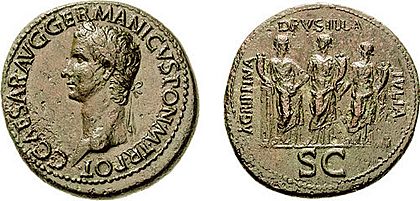
Tiberius died on March 16, AD 37. Agrippina's only surviving brother, Caligula, became the new emperor. Being the emperor's sister gave Agrippina some influence and importance.
Agrippina and her younger sisters, Julia Drusilla and Julia Livilla, received special honors from their brother. These included:
- The right to watch public games from the best seats, like the Vestal Virgins.
- Having their images on new coins, alongside Caligula's.
- Having their names included in important oaths and official motions.
Around the time Tiberius died, Agrippina became pregnant. Domitius was the father. On December 15, AD 37, Agrippina gave birth to a son in Antium. They named him Lucius Domitius Ahenobarbus. This child would later become Emperor Nero. Nero was Agrippina's only biological child.
On June 10, AD 38, Drusilla died, possibly from a fever. After her death, Caligula was said to have changed greatly.
In AD 39, Agrippina and Livilla were involved in a plot against Caligula. They were accused of planning to replace him with their cousin, Marcus Aemilius Lepidus. The plot failed. Lepidus was killed. Agrippina and Livilla were found guilty and were sent away by their brother to the Pontine Islands. Caligula also sold their belongings.
In January AD 40, Domitius died from a medical condition. Lucius, Agrippina's son, went to live with his aunt, Domitia Lepida the Younger. Caligula had taken away Lucius's inheritance.
Caligula, his wife Milonia Caesonia, and their daughter Julia Drusilla were killed on January 24, AD 41. Agrippina's uncle, Claudius, became the new Roman emperor.
Claudius's Reign
Return from Exile
Claudius ended the exile of Agrippina and Livilla. Livilla returned to her husband. Agrippina was reunited with her son, Lucius. Claudius also gave back Lucius's inheritance.
Soon after, a wealthy and powerful man named Gaius Sallustius Crispus Passienus divorced Lucius's aunt to marry Agrippina. They married, and Crispus became Lucius's stepfather. Crispus was a well-known and influential person. He died later, leaving his wealth to Nero.
In the early years of Claudius's reign, Claudius was married to Empress Valeria Messalina. Agrippina was influential but kept a low profile, staying away from the imperial palace. Messalina was Agrippina's cousin.
Messalina saw Agrippina's son, Lucius, as a threat to her own son's future. She tried to harm Lucius. However, Lucius was saved. Agrippina ordered that a snake skin, which was found near Lucius, be kept in a bracelet. Young Nero wore this bracelet for good luck.
In AD 47, Crispus died. There were rumors that Agrippina had caused his death to gain his wealth. After being widowed a second time, Agrippina became very rich. Later that year, at a public event, Agrippina and Lucius received more applause than Messalina and her son Britannicus. Many people felt sympathy for Agrippina due to the difficulties she had faced. Agrippina wrote a memoir about her family's misfortunes and her mother's life.
Rise to Power
After Messalina was removed from power and died in AD 48, Claudius considered marrying for the fourth time. Claudius was known to be easily influenced. Some historians suggest that the Senate may have encouraged Claudius to marry Agrippina. This marriage could help end old family disagreements.
When Claudius decided to marry Agrippina, he convinced senators that it was for the public good. This marriage was not widely approved.
Marriage to Claudius
Agrippina and Claudius married on New Year's Day, AD 49. This marriage was likely part of Agrippina's plan to make her son, Lucius, the next emperor. Their marriage was about power, not love. She quickly removed her rival, Lollia Paulina, from the court.
Before her marriage to Claudius, Agrippina's cousin, Lucius Junius Silanus Torquatus, was engaged to Claudius's daughter, Claudia Octavia. In AD 48, Claudius ended this engagement. Silanus died on the day Agrippina married Claudius. Agrippina later took steps to remove potential threats to Nero's position, including Silanus's brother.
Empress of Rome
On the day Agrippina married her uncle Claudius, she became empress. She also became a stepmother to Claudius's children: Claudia Antonia, Claudia Octavia, and Britannicus. Agrippina removed anyone from the palace who she thought was loyal to the late Messalina. She also removed anyone she saw as a threat to her position or her son's future.
Agrippina gained a strong position for herself and her son through political alliances. These included Claudius's chief secretary, Pallas, and Afranius Burrus, the head of the Praetorian Guard (the emperor's bodyguards). Historians believe Agrippina aimed to secure the throne for Nero from the start. One historian noted, "As soon as Agrippina had come to live in the palace she gained complete control over Claudius."
In AD 49, Agrippina was seated on a platform at a parade. The Celtic King Caratacus bowed before her with the same respect he showed the emperor. In AD 50, Agrippina received the special title of Augusta. She was only the third Roman woman to receive this title, and only the second living woman to have it.
As Augusta, Agrippina quickly became a trusted advisor to Claudius. By AD 54, she had great influence over the emperor's decisions. Statues of her were put up in many cities. Her face appeared on coins. In the Senate, her supporters were given public offices. However, this powerful position caused some anger among senators and the imperial family.
She would listen to the Senate from behind a curtain. Claudius even allowed her to have her own court and make decisions on empire matters. Agrippina signed government documents and met with foreign ambassadors. She also claimed great authority in front of the Senate, the people, and the army.
Also in AD 50, Claudius founded a Roman colony called Colonia Claudia Ara Agrippinensis, now known as Cologne. It was named after Agrippina, who was born there. This was the only Roman colony named after a Roman woman. In AD 51, she was given a special ceremonial carriage called a carpentum. That same year, she appointed Sextus Afranius Burrus as the head of the Praetorian Guard.
She helped Claudius manage the empire and became very wealthy and powerful. Ancient sources say Agrippina successfully influenced Claudius to adopt her son and make him his successor. Lucius Domitius Ahenobarbus was adopted by his great-uncle and stepfather in AD 50. Lucius's name was changed to Nero Claudius Caesar Drusus Germanicus. He became Claudius's adopted son and recognized heir. Agrippina and Claudius arranged for Nero to marry his step-sister, Claudia Octavia. Agrippina also arranged for Seneca the Younger to return from exile to teach the future emperor.
Agrippina worked to keep Britannicus from his father and from becoming emperor. For example, in AD 51, Agrippina ordered the removal of Britannicus's tutor because he was upset about Claudius adopting Nero as his successor instead of his own son.
Nero and Octavia married on June 9, AD 53. Claudius later regretted marrying Agrippina and adopting Nero. He began to favor Britannicus and prepare him for the throne. His actions may have given Agrippina a reason to act. Historical accounts suggest she may have been involved in Claudius's death on October 13, AD 54. He died suddenly at a banquet. Some modern historians believe Claudius, who was 63, may have died of natural causes. After Claudius's death, Agrippina kept it a secret at first. She then quickly presented Nero to the soldiers and senators as the new emperor.
Nero's Reign and Power Struggle
The Start of Conflict Between Mother and Son
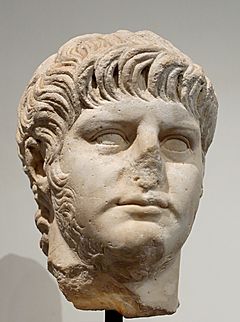
Nero became emperor, and Agrippina was given the title of priestess of the deified Claudius. She tried to use her son's young age to share in ruling the Roman Empire. She enjoyed imperial privileges, like holding court with the emperor and listening to Senate meetings from behind a curtain. She also appeared with her son on coins and statues. The historian Tacitus says she tried to rule alongside her son. She even asked the Praetorian Guard to promise loyalty to her. She also tried to join her son's meeting with ambassadors, but Seneca and Burrus stopped her.
In Nero's first year as emperor, Agrippina guided her 17-year-old son. However, she started losing influence when Nero became romantically involved with a freedwoman named Claudia Acte. Agrippina strongly disapproved and scolded him. Agrippina then began to support Britannicus, possibly to pressure Nero. Nero decided to remove his step-brother. In February AD 55, Nero had Britannicus secretly killed. The power struggle between Agrippina and her son had begun.
Between AD 56 and AD 58, Agrippina became very watchful and critical of her son. In AD 56, Nero forced Agrippina to move out of the palace. However, some of Agrippina's influence over her son lasted for a few more years. These years are often seen as the best part of Nero's reign. But their relationship grew more difficult. Nero slowly took away his mother's honors and powers. He even removed her bodyguards. Nero even threatened to give up the throne and move to the Greek island of Rhodes. Agrippina's power decreased as her allies, like Pallas, were dismissed. By mid-AD 56, she was no longer actively involved in Rome's government.
While Agrippina lived in her residence, Nero sent people to bother her. Even though she lived in Misenum, she was still called Augusta. Agrippina and Nero would see each other during short visits. In late AD 58, Agrippina was accused of trying to overthrow Nero. She also revealed Nero's relationship with Poppaea Sabina.
Death and Aftermath
The details surrounding Agrippina's death are unclear. Historical accounts from that time often conflict and may be biased against Nero.
Tacitus's Account
According to Tacitus, in AD 58, Nero became involved with Poppaea Sabina. Nero decided to kill Agrippina, believing that divorcing Octavia and marrying Poppaea would be difficult with Agrippina alive. However, Nero did not marry Poppaea until AD 62, which makes this motive questionable. Some modern historians think Nero decided to kill Agrippina because she might have been plotting to replace him with another relative.
Tacitus claims Nero first thought about poisoning Agrippina but found it too difficult. Then, on the advice of his former tutor Anicetus, he decided to build a boat that would sink. Agrippina knew about a plot but still got on the boat. She was almost crushed by a collapsing lead ceiling but was saved by a sofa. The boat failed to sink from the ceiling, so the crew then sank it. Agrippina swam to shore. She did not realize this was an assassination attempt. When news of her survival reached Nero, he sent three people to kill her.
Suetonius's Account
Suetonius says Agrippina's constant watchfulness and criticism of Nero drove him to murder her. After months of trying to humiliate her by taking away her power and bodyguards, he also forced her out of the Palatine Hill. He then sent people to bother her with lawsuits and insults.
When he finally decided to kill her, he first tried poison three times. She avoided death by taking an antidote beforehand. Afterward, he set up a machine in her room that would drop ceiling tiles on her while she slept. She escaped again after learning of the plan. Nero's final plan was to get her on a boat that would collapse and sink.
He sent her a friendly letter, inviting her to celebrate with him. He arranged an "accidental" collision between her ship and one of his. When she was returning home, he offered her his collapsible boat instead of her damaged one.
The next day, Nero learned of her survival. Panicking, Nero ordered Agrippina's death.
Cassius Dio's Account
The story from Cassius Dio is also different. It begins with Poppaea as the reason for the murder. Nero designed a ship that would open at the bottom while at sea. Agrippina was on board, and when the ship opened, she fell into the water. Agrippina swam to shore, so Nero sent someone to kill her. Nero then claimed Agrippina had plotted to kill him and had taken her own life.
Burial
Agrippina's body was cremated. At his mother's funeral, Nero was very quiet and seemed scared. When the news of Agrippina's death spread, the Roman army, Senate, and various people sent Nero letters congratulating him on being saved from his mother's supposed plots.
Aftermath
During the rest of Nero's reign, Agrippina's grave was not properly covered. Her household later gave her a simple tomb in Misenum. Nero felt guilty about his mother's death. He sometimes had nightmares about her. He even saw her ghost and asked magicians to help him seek her forgiveness. Years before she died, Agrippina had visited astrologers to ask about her son's future. The astrologers had accurately predicted that her son would become emperor and would kill her. She reportedly replied, "Let him kill me, provided he becomes emperor."
Images for kids
See also
 In Spanish: Agripina para niños
In Spanish: Agripina para niños
 | Sharif Bey |
 | Hale Woodruff |
 | Richmond Barthé |
 | Purvis Young |


